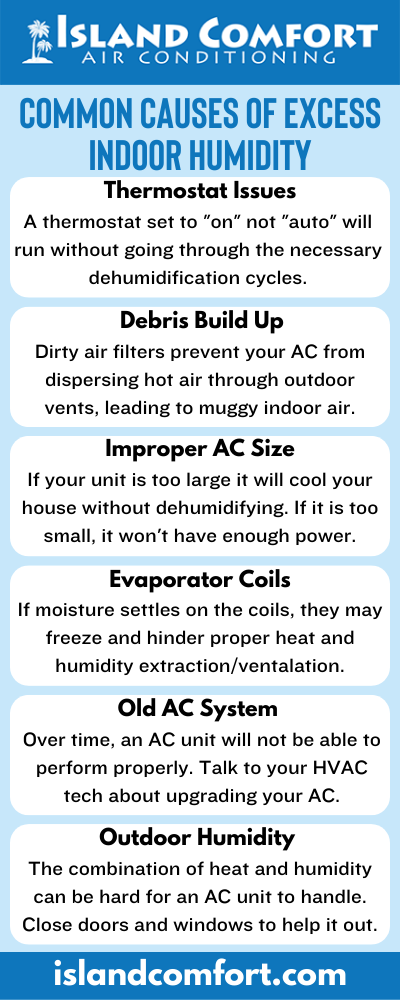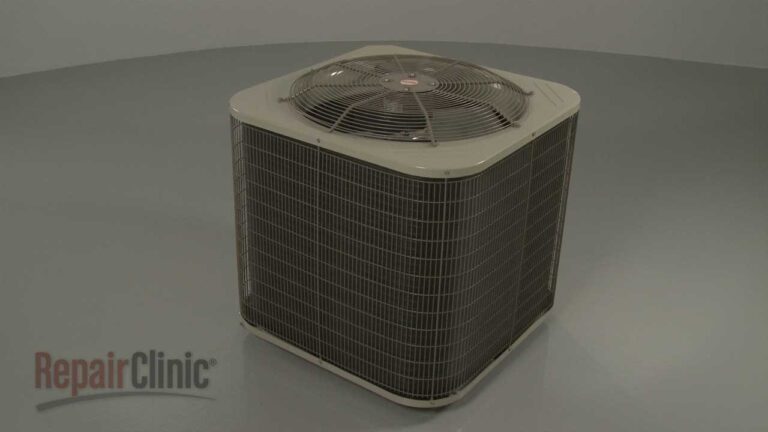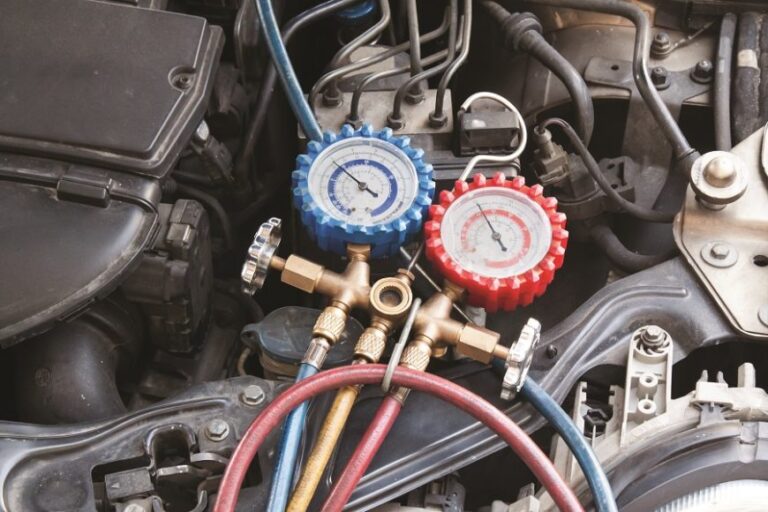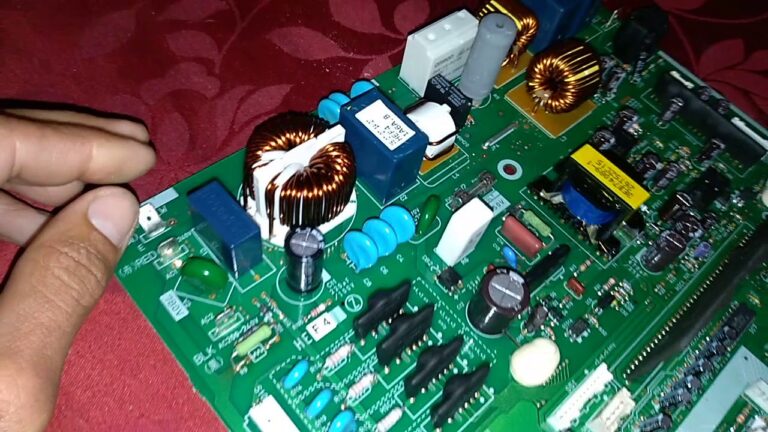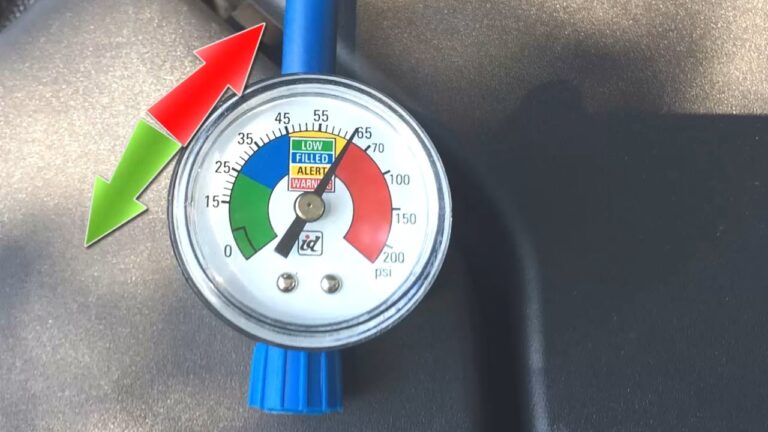Why Is My House So Humid With The AC On? Expert Solutions
Your house may be humid with the AC on due to an oversized unit or poor ventilation. Another reason could be clogged air filters.
Humidity issues can be frustrating, especially when you expect your air conditioning system to provide comfort. An oversized AC unit cools the air quickly but doesn’t run long enough to remove moisture effectively. Poor ventilation can trap humid air inside, exacerbating the problem.
Clogged air filters restrict airflow, reducing the system’s efficiency and its ability to dehumidify. Addressing these issues can help improve indoor air quality and comfort. Regular maintenance, proper sizing, and ensuring adequate ventilation are key to managing humidity levels. Understanding these factors can help you maintain a comfortable and healthy home environment.
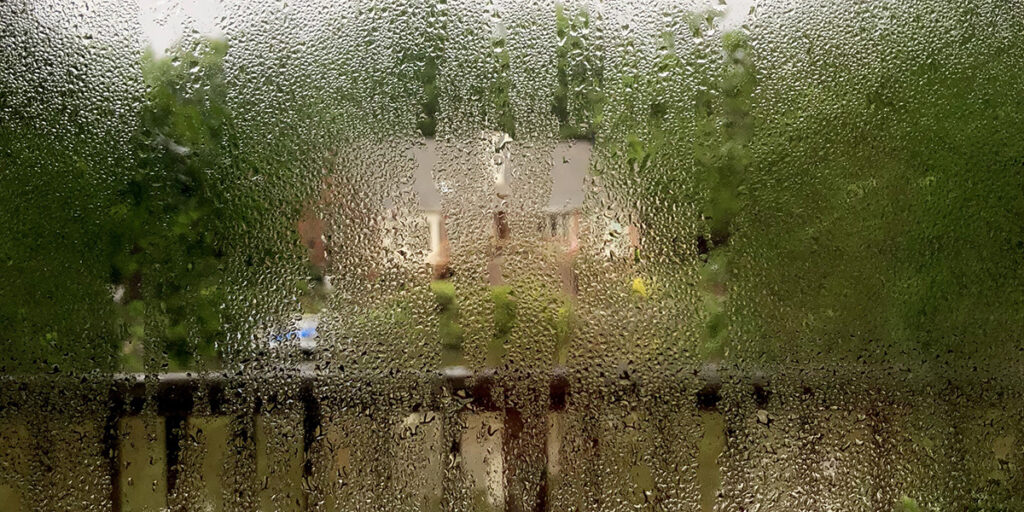
Credit: toplineair.com
Common Causes Of Indoor Humidity
Is your home feeling sticky even with the AC on? You’re not alone. High indoor humidity can be a common issue. Let’s explore some common causes of indoor humidity that might be affecting your comfort.
Poor Ventilation
Poor ventilation is a primary cause of indoor humidity. When air can’t circulate properly, moisture gets trapped inside. This can make your home feel humid and uncomfortable. Ensure your ventilation system is working well. Regularly check and clean air vents. You might also consider using exhaust fans in bathrooms and kitchens. They help remove excess moisture from your home.
Leaky Windows And Doors
Leaky windows and doors can let humid air seep into your home. This can make your AC work harder to maintain a comfortable temperature. Inspect your windows and doors for any gaps or cracks. Use weather stripping or caulk to seal these leaks. You can also invest in energy-efficient windows to reduce humidity and save on energy costs.
| Cause | Solution |
|---|---|
| Poor Ventilation | Check and clean air vents, use exhaust fans |
| Leaky Windows and Doors | Seal gaps with weather stripping or caulk |
Addressing these common causes can significantly reduce indoor humidity. You’ll enjoy a more comfortable home environment.
Ac System Issues
Wondering why your house feels humid even with the AC on? It might be due to issues with your AC system. These issues can significantly impact the system’s ability to control humidity. Let’s explore some common problems.
Inadequate Size
A common reason for high humidity is an inadequately sized AC unit. If your AC is too small, it will struggle to cool your home. It will run constantly but won’t remove moisture effectively.
Conversely, an oversized AC unit can also be problematic. It cools the air too quickly, causing short cycles. This doesn’t allow enough time to remove humidity from the air.
| AC Size | Effect on Humidity |
|---|---|
| Too Small | Runs constantly, fails to dehumidify |
| Too Large | Cools too quickly, short cycles |
Improper Maintenance
Improper maintenance can also lead to high humidity levels. A dirty filter restricts airflow, making it hard for the AC to work efficiently. This can cause humidity to build up in your home.
Regular maintenance is crucial. This includes cleaning or replacing filters, checking the refrigerant levels, and ensuring the coils are clean. A well-maintained AC runs more efficiently and keeps humidity levels in check.
- Change filters regularly
- Check refrigerant levels
- Clean the coils
These simple steps can help maintain proper humidity levels in your home.
Impact Of External Weather
Understanding the impact of external weather is crucial when dealing with home humidity. External weather conditions play a vital role in your indoor environment. The air conditioner (AC) can only do so much. Let’s delve into how outdoor factors contribute to indoor humidity.
High Outdoor Humidity
During summer, outdoor humidity levels are often high. When the air is moist outside, your AC struggles to keep your home dry. The moisture can enter your home through windows, doors, and small cracks. This makes your AC work harder and less effectively.
Your AC cools the air but may not remove all the moisture. This causes the indoor air to stay humid. High outdoor humidity can also make your AC run longer. This leads to higher energy bills and less comfort.
Seasonal Changes
Seasonal changes have a significant impact on indoor humidity. Each season brings different weather patterns that affect your home’s humidity levels.
Spring: Spring brings rain and blooming plants. This increases outdoor moisture, which seeps into your home.
Summer: Summer is the most challenging season for humidity control. High temperatures and humidity levels make your AC less efficient.
Autumn: Autumn is a transitional season. It often has varying levels of humidity which can still impact your home.
Winter: Winter is usually drier. Heating systems can reduce indoor humidity, but moisture can still enter through leaks.
Understanding these seasonal changes can help you manage indoor humidity better. It’s important to maintain your AC and ensure your home is well-sealed against external conditions.
Household Activities
Household activities contribute significantly to indoor humidity levels. Even with the AC on, daily tasks can add moisture to the air. Understanding these activities can help manage indoor humidity.
Cooking And Showering
Cooking on the stove releases steam into the air. Boiling water, simmering sauces, and frying foods all generate moisture. This moisture increases indoor humidity levels.
Showers are another major source of indoor humidity. Hot showers produce steam, which fills the bathroom and spreads through the house. Long, hot showers add more moisture than quick, cool ones.
Drying Clothes Indoors
Drying clothes indoors can significantly increase humidity. Wet clothes release moisture as they dry. This moisture enters the air, raising the humidity level.
If possible, dry clothes outside or use a dryer vented to the outside. These methods help keep indoor humidity levels lower.
| Activity | Humidity Impact |
|---|---|
| Cooking | High |
| Showering | Very High |
| Drying Clothes Indoors | Moderate to High |
To manage indoor humidity, consider these tips:
- Use exhaust fans while cooking.
- Take shorter, cooler showers.
- Dry clothes outside or use a vented dryer.
Role Of Insulation
Insulation plays a critical role in maintaining your home’s humidity levels. If your home is poorly insulated, your AC might struggle to control humidity. Let’s explore how insulation quality and gaps impact your home’s humidity.
Insulation Quality
Insulation quality affects how well your home retains cool air. Good insulation keeps cold air inside and hot air outside. Poor insulation can lead to higher humidity levels. This is because your AC will have to work harder to cool the space. As a result, it may not remove humidity effectively.
Check the R-value of your insulation. The R-value measures how well insulation resists heat flow. Higher R-values indicate better insulation. Poor insulation with low R-values can make your home more humid. Consider upgrading your insulation to control humidity better.
Gaps And Cracks
Gaps and cracks in your home can let humid air enter. Even small gaps can have a big impact on humidity. Check around windows, doors, and vents. Seal these gaps to improve your home’s insulation.
Use weatherstripping and caulk to seal gaps. Weatherstripping is good for doors and windows. Caulk works well for smaller cracks. By sealing these gaps, you can keep humid air out and cool air in. This can help your AC work more efficiently.
| Factors | Impact on Humidity |
|---|---|
| Insulation Quality | Better insulation reduces humidity |
| Gaps and Cracks | Sealing gaps keeps humid air out |
- Check the R-value of your insulation.
- Seal gaps around windows and doors.
- Use weatherstripping for better insulation.
- Caulk small cracks to improve efficiency.
Dehumidifier Benefits
Is your house feeling humid despite the AC running? A dehumidifier can help. Dehumidifiers offer numerous benefits, ensuring a comfortable and healthy living environment.
How Dehumidifiers Work
Dehumidifiers reduce the humidity in your home. They draw in moist air and remove excess moisture. The air then gets released back, now drier and more comfortable. This process keeps your home’s humidity at an ideal level.
Choosing The Right Model
Picking the right dehumidifier is key. Consider the size of your room and the humidity level. Here’s a simple table to guide you:
| Room Size | Dehumidifier Capacity |
|---|---|
| Small (up to 500 sq ft) | 30-pint |
| Medium (500-1500 sq ft) | 50-pint |
| Large (1500+ sq ft) | 70-pint |
Consider these features when choosing:
- Energy Efficiency: Saves on electricity bills.
- Noise Level: Quieter models offer a peaceful home.
- Tank Capacity: Larger tanks need fewer emptying sessions.
Dehumidifiers also improve air quality. They reduce allergens like mold and dust mites. This benefits those with allergies or asthma.
Improving Airflow
Experiencing high humidity levels in your home despite having the AC on can be frustrating. Improving airflow is a great way to reduce humidity. Proper airflow helps the air conditioner work efficiently. Let’s explore some methods to improve airflow and reduce humidity.
Using Fans
Fans are excellent tools for enhancing airflow. They help distribute cool air throughout your home. Place fans in areas where air circulation is low. Ceiling fans are especially effective in promoting airflow. Use them to push air down in summer mode.
- Install ceiling fans in rooms with poor air circulation.
- Use pedestal fans in corners to move air.
- Turn on exhaust fans in bathrooms and kitchens.
Opening Windows
Opening windows can significantly improve airflow. This method works best during cooler times of the day. It allows fresh air to enter and stale air to exit. Open windows on opposite sides of your home to create a cross-breeze.
- Open windows early in the morning and late evening.
- Create a cross-breeze by opening windows on opposite sides.
- Use window screens to keep insects out.
Combining these strategies can improve airflow and reduce humidity. Fans and open windows are simple yet effective solutions.

Credit: galleryr.org
Professional Solutions
Finding your house humid with the AC on can be frustrating. Fortunately, professional solutions exist to solve this issue. These solutions ensure your HVAC system works efficiently, keeping your home comfortable.
Hvac System Check
An HVAC system check is a crucial step. A professional technician will inspect your AC unit. They will identify any issues affecting performance. Common problems include clogged filters, refrigerant leaks, or faulty components.
Regular maintenance of your HVAC system is essential. It helps prevent humidity problems. A well-maintained system runs efficiently, ensuring optimal performance. Schedule regular checks to keep your AC in top shape.
Expert Recommendations
Experts offer valuable recommendations to control humidity levels. One suggestion is to install a dehumidifier. Dehumidifiers work alongside your AC to remove excess moisture. They help maintain a comfortable indoor environment.
Another recommendation is to seal any leaks in your home. Leaks can allow humid air to enter. Sealing gaps around doors and windows helps. Use weather stripping or caulking to seal these areas effectively.
Experts also suggest checking your home’s insulation. Proper insulation prevents humidity issues. It keeps your home cool in summer and warm in winter. Ensure your attic and walls have adequate insulation.
| Solution | Description |
|---|---|
| HVAC System Check | Regular inspections and maintenance of your AC unit. |
| Install Dehumidifier | Removes excess moisture from the air. |
| Seal Leaks | Prevents humid air from entering your home. |
| Check Insulation | Ensures proper temperature regulation in your home. |

Credit: sanbornsac.com
Frequently Asked Questions
How Do I Lower The Humidity In My House With Ac?
To lower humidity with AC, set the unit to “dry” mode if available. Ensure proper maintenance and clean filters. Use a dehumidifier alongside your AC for better results. Close windows and doors to keep humid air out. Keep the thermostat set to a consistent temperature.
Why Does My House Feel Humid With The Ac Running?
Your house may feel humid with the AC running due to a dirty filter, oversized unit, or poor ventilation. Ensure regular maintenance, and check for leaks or blockages. This will help your AC dehumidify effectively.
Why Is My Ac Not Removing Humidity?
Your AC may not remove humidity due to incorrect settings, a dirty filter, or a system malfunction. Ensure proper maintenance and check settings.
Conclusion
Understanding why your house is humid with the AC on is crucial. Check for issues like poor insulation or clogged filters. Regular maintenance can help. Consider using a dehumidifier for better results. A balanced approach ensures comfort and energy efficiency.
Keep your home cool and dry all year round.

